|
|
|
 |
Chapter V
Haidoni And The Vampyres
From "The Land Of Rip Van Winkle" (1884)
By A.E.P. Searling |
|
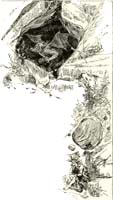
Vampyre's Den And Death Of The Stone Giant
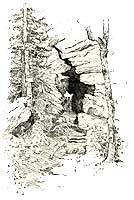
Pilgrim's Pass
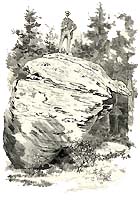
Turtle Rock
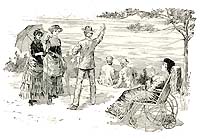
Before Old Mount House
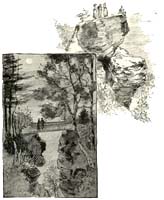
Styles Gorge And Pulpit Rock
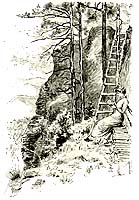
Poet's Bench, Overlook
|
Haidoni was a hero of great fame among the six nations and the Seneca tribe. So great was his bravery and his pride in showing it, that Manitou was especially favorable to him, and helped him through many of his difficult exploits. Not the least of these had been an excursion alone to the Cherokees in search of scalps and glory. The Iroquois counted life well lost for the latter achievement. Taking nothing for his long journey to the Western plains but his bow and arrows, and a little pouchful of parched and ground corn, which has great sustaining qualities, he set out. After long wandering with many remarkable experiences, and escapes from death, he came to a Cherokee council fire. The council broke up in a dance, and soon one of the young braves wandering into the bushes, our hero quickly despatched him without noise and secured his scalp. He got three similar trophies in this manner and then left, stealing away through the undergrowth to escape detection. On his homeward journey, he came to a lodge in a lonely place, and waiting here in the same manner as before, soon secured the life and scalp of its owner. Entering the lodge in search of plunder he found food and tobacco, having enjoyed which, he lay down on the bed in the corner, and soon fell asleep. He was awakened by the entrance of an old squaw, who, mistaking him for her murdered son, said: "My son, I am going away, and will not be back till tomorrow." When she had left him, he sprang up, and, hastily appropriating what food could be found, fled. And none too soon was his flight begun, for his inroads having been traced he was hotly pursued, and barely escaped, to tell the tale of his prowess, and display his four scalps about the friendly fires of his own people.
Haidoni's favorite employment was hunting deer, and his customary hunting ground the lake behind Overlook Mountain. Here, on dark nights, he would paddle noiselessly in his bark canoe, hidden by green boughs in front of him, and with a flaring pine knot fastened at the prow. The timid creatures, attracted by the light, would come to the water's edge, when a noiseless arrow speeding on its unerring errand of death finished the story. Sometimes as many fine bucks as the fingers on both his hands, he was said to have killed thus in a night. But one night, as he stole along seeking here and there for the shadow on the shore, and the two bright dazzled eyes that indicated his prey, his usual good genius seemed to have deserted him, for not one shot did he get, and already the long hours had worn away half the night. Stillness covered the lake like a mantle, and brooded over it like a foreboding of evil, so that when at long intervals the far-off cry of a panther or the splash of a fish on the water broke the quiet for an instant, the fleeting noise seemed only to make the silence more oppressive. Suddenly he perceived the two fiery balls by the lakeside, though there was no crackling of twigs; the silence seemed deeper than ever, but there were the bright eyes. For a moment he hesitated, then pulled the bowstring, when out on the night air rung such a shriek of wild inhuman pain that his arm fell at his side, and his heart stopped with terror. No more shooting that night, so he hastily guided his canoe across the lake, and climbed up the high side of Overlook, to escape the dismal neighborhood of the lake. On the top were dry leaves in plenty, and parched corn, all hidden in a cave he knew of, and, making for that, he soon satisfied his hunger, and prepared his bed for the few remaining hours before dawn. Passing out to a little spring in the hill-side, he stooped beside a great hollow log to quench his thirst. He suddenly felt himself seized by the leg, and, reaching out, clutched a warm human hand. Out from the log he dragged an Indian maiden, whose features he could now see by the light of the rising moon to be convulsed with terror. Her fears being soothed, she told him her story.
She said she had become separated from her tribe with her sister, as they were on a hunting expedition on these mountains, and they had wandered together through the trackless wilderness, suffering untold agonies. This Overlook Mountain, she said, was infested with vampires, who nightly pursued them to suck their blood. Exhausted at last, they had sunk down and fallen asleep. How long they slept she could not tell, but early in the night, while Haidoni had been hunting on the lake, she was awakened by a sound as of some one eating and drinking beside her. Starting up, she beheld a vampire sucking her sister's blood and eating her flesh, now dead. His form was so frightful, with its long beard dripping blood and great glaring eyes of fire, that she fled through the woods wildly seeking a hiding-place. The vampire, not relishing the loss of so dainty a meal, pursued her closely, giving forth a fearful war-whoop! (Fancy a ghost with a war whoop!) Sliding quickly into the hollow log, the vampire rushed past her, not seeing, and probably passed on to the lake-side, for not long after she heard a terrific shriek, and the echoes repeating it by the shores of the hill-bound water.
"He is dead, then," said Haidoni, "for I shot, a short while since, a creature which was no deer, and its death yell was what you have heard."
|
The young squaw went with her deliverer, and after several more meetings with vampires that night, and victories over the same, she concluded to remain with so valiant a warrior and go with him to his tribe. His arrows were thenceforth accounted to be invincible by reason of Manitou's favor, as no man else could kill so dread a demon as a vampire.
From Overlook to Plattekill Clove is perhaps the most beautiful drive the mountains afford. The trees have been cut away at intervals, giving glimpses of the valley below. The road runs all along the ridge of the mountain, and on that delicious September day, when the travellers, with whom our interest lies at present, passed over it, all the energies of nature seemed to have been put forth to adorn it. A damp wood odor arose like incense, and the ground beneath the trees was a painted carpet of lush green moss sprinkled with gray-haired lichens, while the bloodroot and an occasional fallen leaf, turned gray, red, or yellow, made just the touches of color that the picture needed. The birches, those vestal virgins of the woods, stood, white and still, gleaming far within the cool forest depths, and the maples were donning their gay raiment, for October was not far away. When will the people who flock hither from cities learn that the high festival time up here is later, when all the gorges and mountain sides are one blaze of color? They see it from the river as they come down from a late sojourn at Lake George or Saratoga they cry out in delighted surprise at the wonderful rose-purple in which the Catskills are bathed, but they pass on down, content without nearer inspection. Think how they look when Indian summer has crept up the cloves and some wise old habitue goes following after to see the wonders that are there. The glory that covers them then might well nigh turn one's head with a kind of delirium of beauty, and yet the great caravansaries of hotels are closed, the summer boarder has departed, and silence reigns in the rocky fastnesses.
On this day of which I write, some regret was expressed that travellers could not find bed and board in the wonderful season of turning leaves. Everybody said that "next year it must be managed, really next year we must come in October." |
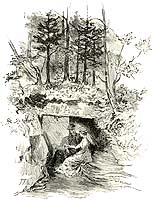
Lover's Retreat, Overlook
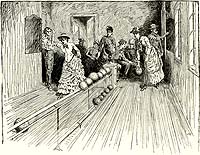
Bowling
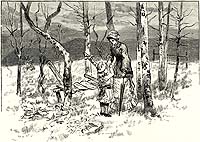
Overlook Playground
|
Here let us take up Miss Rutherford's journal, an adjunct to her travelling gear the which she cared for most religiously " for," said she, "if I do not write it up each day I should get all these waterfalls, and ravines, and devil's cauldrons, and kitchens, and stairways so inextricably confused that five years hence I should find myself describing Haines' Falls as running down Overlook Mountain, or that dreadful Black Chasm we went to on our way to Plattekill Clove, as yawning under the old Mountain House."
Thursday, Sep. 22d. – Enjoyed a charming day in true mountaineer fashion, but feel the effects of the climbing and walking, in a strained sensation all over the body and a strong desire to get to bed. We begun the day in fine spirits, for this air invigorates like wine, and one danger of the place is said to be this very effect of lightness and elasticity that comes to you, for, under its stimulating influence many people overtax themselves, and pay the penalty when again on terra firma. (There, I still preserve the delusion of walking on air, that has haunted me all day!)
We started immediately after breakfast on our tramp, leaving groups of less enterprising pleasure seekers lounging about the piazzas, or discoursing after the usual manner of tourists on the cliff. How far you can see with and without a glass seems to absorb the entire attention of most people, and a condition of atmosphere in which the capitol at Albany (by a slight stretch of imagination) can be seen from a cliff half a mile away, engenders more excitement than a fine sunset or a mist-mantled moon. This latter sight we were permitted to behold this evening. Little breezes tore the mist into shreds and patches, and blew it away in soft clouds from the face of Diana. It was a noiseless, mysterious battle between the gods of the upper air, and the seat of war seemed not fifty feet from our faces. She has conquered, has my lady Moon, for I could not have left the cliff with the battle undecided, and now sails serenely over our heads, turning the few clouds that still fly by beneath us into effulgent silver down, an intangible substance belonging to some other world, whereon, for aught I know, the old deities may once more ride or recline when these watchful mortal eyes of ours are closed.
|
|
Mr. Grant said we must find a point below the ledge where a wonderful view could be got, but he wasn't sure whether it was "Inspiration Rock" or "Turtle Rock," or a "Devil's Kitchen"; on second thoughts, he felt positive it was a poet's something. Somebody asked if he was sure it wasn't "Lovers' Retreat." There did not seem to be any reason for Polly Perkins to blush. If any thing could be wanting to complete the vulgarity of that sort of remark, it is for some inconsequent woman to blush.
|
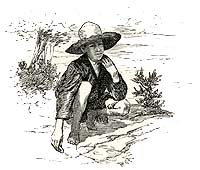
Boy Artist (Guide)
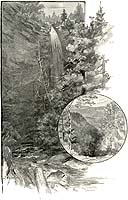
Black Chasm
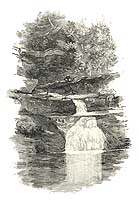
Terrace Falls, Plattekill
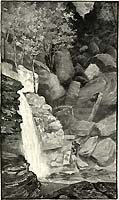
The Hell Hole
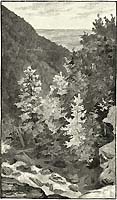
Plattekill Clove |
I should like to stay here a week, for these beautiful walks need a more careful inspection, though I stored up enough loveliness in my mind to last a long time. We came home at noon with great armfuls of maiden-hair fern, and harebells, and sweet fern, and partridge vines, not to mention the birch-bark and queer fungi and lichens. No doubt we shall throw them all away as too burdensome before we reach New York. I am already filled with regret at despoiling the woods of them. After dinner we lounged awhile, and then watched a game of billiards; this, with a short walk and an hour in the bowling alley, finished the day.
Of all the views, I suppose nothing here is so wonderful as that from the tower, though some little feeling I had of dissatisfaction with it seemed to be expressed in a remark of our Artist - "It lacks foreground." You want a near object of comparison.
Foreground or not though, it inspires one with a sort of exaltation, and quite justifies Mr. Grant's remark: "I should think a race of artists ought to spring up here, if nature has any influence over the spirit of man."
I found a promising instance of his theory today in a boy - big-hatted, indigenous boy - who was drawing pictures with a stone on the smooth surface of a flat rock; but, alas! for the inspiration of the mighty hills, I found on closer inspection he was trying his "prentice hand" on a caricature of a distraught looking youth, from the hotel, whom he had set down as an amateur poet!
Friday, Sep. 23d. - Enjoyed a delightful drive across the mountains this morning, and down through Plattekill Clove, from there to Saugerties, taking in Caatsban on the way. The Plattekill is to my mind the finest clove of all, and nothing could be finer than that one grand sweep - the Horse-Shoe Curve, they call it, I believe, - and the view from there is very fine out through the gorge, showing a section of the valley - that is, if one has the heart to look, which, I confess, I had not. With our wagon creaking and rocking on the very edge of a yawning chasm, I could do little else but shut my teeth and pray that the brakes would hold as we went lurching down the mountain.
Captain Oldbore said we must turn out of our way a little to pass through Caatsban with its old stone church and its historical associations. We were very glad to adopt this suggestion, for we had plenty time before the evening boat for New York left the dock at Saugerties, and we were loath to leave this lovely country. So, we turned northward, still keeping to the sides and watching with regretful eyes the grand old mountains as their softened outlines receded behind us.
Caatsban is well worth while seeing, with its old stone houses and the church of ancient Dutch build. The latter is not much to look at now since the ruthless people have "modernized" it, putting a white painted wooden steeple on it, but it stands facing the road which climbs a gradually ascending hill, its position is very imposing, and nothing could be prettier than the picture one readily conjures up of the congregation, A. D. 1750, as they wended their way up this very road to morning service in quaint Holland costume.
Before you come to the church there is an old stone house, higher than ordinary, built a little way back from the road, with that quaint look at the gable end, of a woman with her hair parted in the middle and smoothed meekly down over her ears. The front yard is a grove of high poplars; altogether the place has an old-world haunted look, and even its ghosts would seem foreign fancy. Think of all the ghosts talking Dutch, as they must, of course, in this region.
From Caatsban we struck down toward the river road to take in a great dreary marsh called "The Gra Vly" or "Big Swamp." I do not know whether that is good Dutch or not; it is the vernacular. John Grant gave us a story about it which I append here to my journal as a souvenir of this interesting place.
|
|
|







